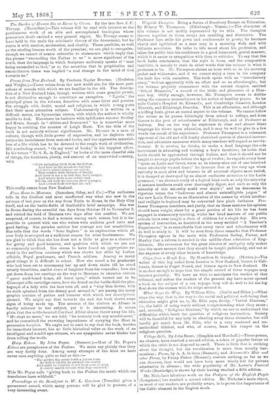this volume is not unfitly represented by its title. The
thoughts thrown together in those essays are rambling and discursive. The Professor lays aside his gown and condescends to gossip, ho becomes chatty and egotistical as a man may in a morning walk and with intimate associates. He talks in idle mood about his profession, and takes the public into his confidence in a good-humoured, genial manner, which it is easier to sympathize with than to criticize. To say that the book lacks conciseness, that the style is loose, and the composition inartistic, is merely to state in other words that the volume is what it professes to be. Mr. Thompson claims an hour with us iu his morning jacket and wideawako, and if wo cannot enjoy a turn in his company the fault lies with ourselves. The book opens with an introductory essay," written apparently with an effort and as an afterthought ; but the volume properly commences with the second chapter, entitled "School Memories," a record of the trials and pleasures of a Blue- coat boy. Oddly enough, however, Mr. Thompson seems to dislike using the common nomenclature in his notice of familiar places. So he calls Christ's Hospital St. Edward's, and Cambridge Camelot, London Nineveh, and Edinburgh Dunedin. This is an affectation, and although a trifling fault, gives an unreal aspect to the volume. We cannot follow the writer as he passes loiteringly from school to college, and from thence to the post of schoolmaster at Edinburgh, and of Professor at Galway. But on the way he expresses in clear and almost blunt language his views upon education, and it may be well to give in a few words the result of his experience. Professor Thompson is a vehement opponent of the old and still fondly cherished system of classical instruc- tion, and advocates measures which many teachers will regard as revolu-
tionary. It is unwise, he thinks, to make a dead language the sole instrument in educating and training a boy's faculties ; he holds that Latin should be approached through Italian, and that it should not be taught to average pupils before the ago of twelve ; he regards every hour "spent on Latin and Greek verse as in ninety-nine out of one hundred cases absolutely wasted time ;" he laments that at the very age when curiosity is most alive and interest in all external objects most varied, it is damped or destroyed by an almost exclusive attention to the Latin
grammar, "an abstract study of a logical kind such as only the minority of mature intellects could ever thoroughly digest, and such as only the minority of this minority could ever enjoy ;" and he denounces in vigorous terms the "ludicrous and almost unintelligible jargon" of the new Latin Primer as an illustration of the means by which intellec- tual twilight in boyhood may be converted into pitch darkness. Pro- fessor Thompson considers, and justly, that on these matters his opinion should have weight, since for a great portion of his life he has been engaged in elementary teaching, whilst few head masters of our public schools have ever taught a class of children for a single day. His own system of instruction, as described in the essay entitled " A Teacher's Experiences," is so remarkable that every tutor and schoolmaster will do well to study it. It will be soon from those remarks that Professor Thompson agrees in the main with Professors Seeley, Farrar, and Huxley that a reform is needed in the middle-class education of Eng- lishmen. His reverence for the great classics of antiquity only makes him the more earnest that they should be taught judiciously, and not at the expense of every other branch of knowledge.


































 Previous page
Previous page